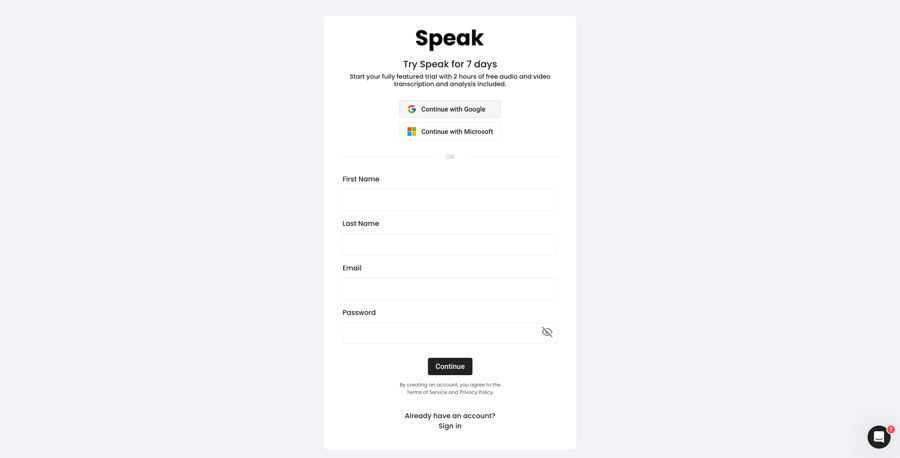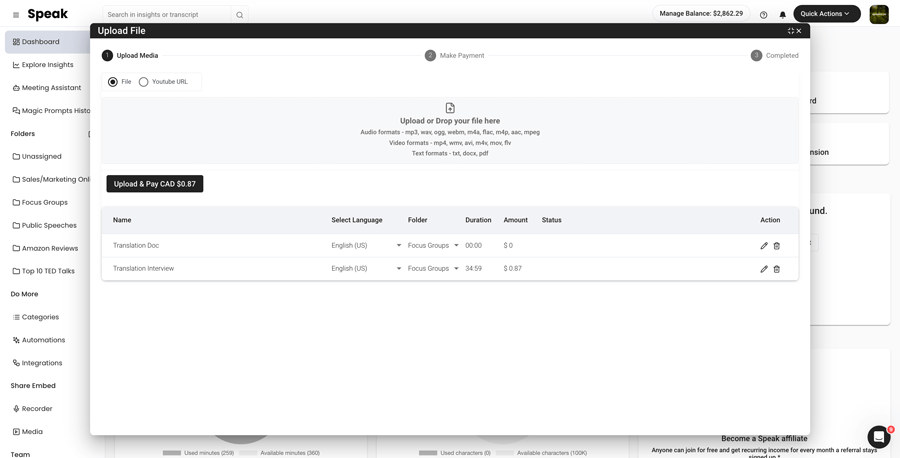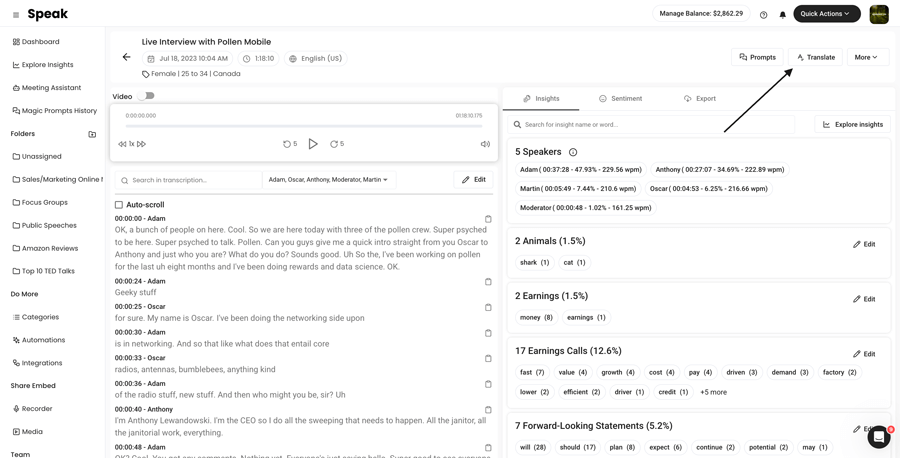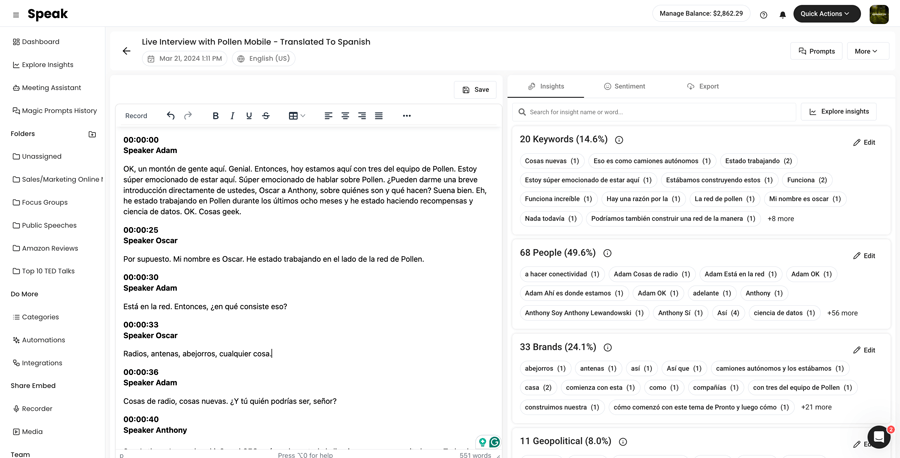How To Translate German to Sanskrit
Translating German to Sanskrit is super simple!

Step 1: Register for Speak
Register for Speak using this link.
Once you register, you can instantly begin translating your German to Sanskrit file(s).

Step 2: Upload Your German file(s)
As soon as you log in, you will be redirected to the dashboard.
Once there, you can select the Quick Action "New Upload".
In Speak, you can seamlessly upload, transcribe and translate audio, video and text files all at once!

Step 3: Translate Your German file(s) to Sanskrit
Once the file is uploaded, simply visit your file and select "Translate".
If it is an audio and video file, Speak will ask you if you want to keep the speaker names and timestamps in the translation.
Want to translate many files at once? No problem!
You can view the files you want to automatically translate from German to Sanskrit from the folder level and instantly translate as many files as you need with our artificial intelligence translation in just a few clicks.

Step 4: That's It! View, Analyze, Modify & Export Your New Sanskrit file(s)
Once the translation is done, you will be alerted and you will see a new document in the same folder your original file is in.
The file will be named the same but with a dash indicating that it is the translated version.
Need support with your German translation?
We are always here and happy to help at Speak!
Just send us a message on live chat on the bottom right corner and we will ensure you are set up for success.
Interested in translating German or other languages to different languages? View our entire list of supported translation languages here.
Automatic, accurate, instant AI translation from German to Sanskrit is here for you.
Register for Speak using this link and begin translating German to Sanskrit today.
Unlocking the Power of Language: Translate German to Sanskrit with AI
In our rapidly globalizing world, the ability to communicate across cultural and linguistic barriers has never been more critical. With the advent of AI and Natural Language Processing (NLP), the once-daunting task of translating complex languages is now more accessible and efficient. Speak AI, a leader in the integration of NLP, large language models, data visualization, and Generative AI, is at the forefront of this revolution. This article explores the myriad benefits, use cases, and the exceptional value proposition offered by translating German to Sanskrit, particularly leveraging AI-driven technologies.
Revolutionizing Research and Business Through AI Translation
The translation from German to Sanskrit, though seemingly niche, has significant implications for researchers, businesses, and linguists worldwide. Speak AI's software, equipped with NLP and AI Meeting Assistant capabilities, is not just a tool but a bridge connecting the rich histories and knowledge systems of the German and Sanskrit-speaking worlds.
- Enhancing Academic Research: Researchers delving into Indo-European linguistics, ancient texts, or comparative literature can greatly benefit from automatic translation, ensuring accuracy and saving countless hours of manual work.
- Empowering Businesses: Companies looking to tap into new markets or collaborate with international partners can utilize AI-driven translations to understand cultural nuances, legal documents, and technical materials without the need for costly human translators.
- Facilitating Cross-Cultural Exchange: Cultural organizations and educational institutions can leverage these translations to make ancient Sanskrit texts accessible to German-speaking audiences, promoting a deeper understanding of heritage and traditions.
Cost and Time Efficiency: The Speak AI Advantage
With Speak AI's translation services, the benefits extend beyond the mere conversion of text from one language to another. Our AI Meeting Assistant can join calls on platforms like Microsoft Teams, Zoom, Google Meet, and Webex, offering real-time transcription and analysis in multiple languages, including the capability for German to Sanskrit translations.
Automatic Analysis: Beyond Translation
Our sophisticated AI doesn't just translate; it analyzes. This means users don't only get the text in a different language but also insights into sentiment, key phrases, and terminology relevancy, empowering users to make informed decisions swiftly.
Cost-Saving
By automating the translation process, businesses and researchers can significantly reduce the costs associated with hiring specialist translators, which is particularly beneficial for less commonly translated language pairs like German to Sanskrit.
Time-Saving
Speed is of the essence in today's fast-paced world. Speak AI's technology dramatically reduces the time needed for translation, enabling quick turnarounds for projects that would otherwise take weeks or even months.
German and Sanskrit: Bridging Worlds
German and Sanskrit: Locations and Statistics
German is predominantly spoken in Germany, Austria, Switzerland, Luxembourg, and Liechtenstein, with over 130 million speakers worldwide. Sanskrit, an ancient language of India, has a rich heritage and is used in religious and ceremonial contexts, with estimations suggesting around 20,000 people today have some familiarity with the language.
Fun Facts and Historical Gems
- German and Sanskrit are both part of the Indo-European language family, sharing astonishing similarities in syntax and vocabulary, hinting at a common ancestral language.
- German scholars like Max Müller played a pivotal role in the study and popularization of Sanskrit in the 19th century, fascinated by its structure and philosophical texts.
Differences and Similarities: A Linguistic Tapestry
While German is a Germanic language, evolving and adapting over centuries, Sanskrit's form has remained more static, preserved through literary and religious texts. Their grammatical structures offer a fascinating study in contrasts and parallels, from the complex case system of Sanskrit to the gender and case agreements in German. Both languages contribute uniquely to the linguistic diversity of the human experience, offering insights into the cultures and philosophies they embody.
Speak AI: Your Partner in Multilingual Communication
In conclusion, the translation of German to Sanskrit, empowered by Speak AI's advanced technologies, opens up new vistas for understanding, collaboration, and exploration across diverse fields. Whether you're a researcher uncovering ancient wisdom, a business venturing into new markets, or simply a language enthusiast, the integration of NLP, large language models, and automatic translation by Speak AI offers unmatched value.
With a 4.9 rating on G2 and over 150K satisfied users, Speak AI is committed to innovating at the intersection of language and technology, ensuring that language barriers are no longer an obstacle but a gateway to global connectivity and understanding. Discover a world of possibilities with Speak AI and embark on a journey of linguistic discovery and innovation from German to Sanskrit and beyond.
Translate German To These Other Supported Languages:
- Translate German-to-Afrikaans
- Translate German-to-Albanian
- Translate German-to-Amharic
- Translate German-to-Arabic (Egypt)
- Translate German-to-Arabic (Iraq)
- Translate German-to-Arabic (Israel)
- Translate German-to-Arabic (Jordan)
- Translate German-to-Arabic (Kuwait)
- Translate German-to-Arabic (Lebanon)
- Translate German-to-Arabic (Oman)
- Translate German-to-Arabic (Palestinian Authority)
- Translate German-to-Arabic (Qatar)
- Translate German-to-Arabic (Saudi Arabia)
- Translate German-to-Arabic (Syrian Arab Republic)
- Translate German-to-Arabic (United Arab Emirates)
- Translate German-to-Arabic Modern Standard (Bahrain)
- Translate German-to-Armenian
- Translate German-to-Assamese
- Translate German-to-Aymara
- Translate German-to-Azerbaijani
- Translate German-to-Bambara
- Translate German-to-Basque
- Translate German-to-Belarusian
- Translate German-to-Bengali
- Translate German-to-Bhojpuri
- Translate German-to-Bosnian
- Translate German-to-Bulgarian
- Translate German-to-Catalan
- Translate German-to-Cebuano
- Translate German-to-Chinese (Simplified)
- Translate German-to-Chinese (Traditional)
- Translate German-to-Corsican
- Translate German-to-Croatian
- Translate German-to-Czech
- Translate German-to-Danish
- Translate German-to-Dari
- Translate German-to-Dhivehi
- Translate German-to-Dogri
- Translate German-to-Dutch
- Translate German-to-English
- Translate German-to-English (Australia)
- Translate German-to-English (Indian)
- Translate German-to-English (Irish)
- Translate German-to-English (New Zealand)
- Translate German-to-English (Scottish)
- Translate German-to-English (South African)
- Translate German-to-English (United Kingdom)
- Translate German-to-English (United States)
- Translate German-to-Esperanto
- Translate German-to-Estonian
- Translate German-to-Ewe
- Translate German-to-Farsi (Persian)
- Translate German-to-Filipino Tagalog
- Translate German-to-Finnish
- Translate German-to-French
- Translate German-to-French (Canada)
- Translate German-to-Frisian
- Translate German-to-Galician
- Translate German-to-Georgian
- Translate German-to-German
- Translate German-to-German (Swiss)
- Translate German-to-Greek
- Translate German-to-Guarani
- Translate German-to-Gujarati
- Translate German-to-Haitian Creole
- Translate German-to-Hausa
- Translate German-to-Hawaiian
- Translate German-to-Hebrew
- Translate German-to-Hindi
- Translate German-to-Hmong
- Translate German-to-Hungarian
- Translate German-to-Icelandic
- Translate German-to-Igbo
- Translate German-to-Ilocano
- Translate German-to-Indonesian
- Translate German-to-Irish
- Translate German-to-Italian
- Translate German-to-Japanese
- Translate German-to-Javanese
- Translate German-to-Kannada
- Translate German-to-Kazakh
- Translate German-to-Khmer
- Translate German-to-Kinyarwanda
- Translate German-to-Konkani
- Translate German-to-Korean
- Translate German-to-Krio
- Translate German-to-Kurdish
- Translate German-to-Kurdish (Sorani)
- Translate German-to-Kyrgyz
- Translate German-to-Lao
- Translate German-to-Latin
- Translate German-to-Latvian
- Translate German-to-Lingala
- Translate German-to-Lithuanian
- Translate German-to-Luganda
- Translate German-to-Luxembourgish
- Translate German-to-Macedonian
- Translate German-to-Maithili
- Translate German-to-Malagasy
- Translate German-to-Malay
- Translate German-to-Malayalam
- Translate German-to-Maltese
- Translate German-to-Maori
- Translate German-to-Marathi
- Translate German-to-Meiteilon (Manipuri)
- Translate German-to-Mizo
- Translate German-to-Mongolian
- Translate German-to-Myanmar (Burmese)
- Translate German-to-Nepali
- Translate German-to-Norwegian
- Translate German-to-Nyanja (Chichewa)
- Translate German-to-Odia (Oriya)
- Translate German-to-Oromo
- Translate German-to-Pashto
- Translate German-to-Persian
- Translate German-to-Polish
- Translate German-to-Portuguese
- Translate German-to-Portuguese (Brazilian)
- Translate German-to-Portuguese (Portugal)
- Translate German-to-Punjabi
- Translate German-to-Quechua
- Translate German-to-Romanian
- Translate German-to-Russian
- Translate German-to-Samoan
- Translate German-to-Sanskrit
- Translate German-to-Scots Gaelic
- Translate German-to-Sepedi
- Translate German-to-Serbian
- Translate German-to-Sesotho
- Translate German-to-Shona
- Translate German-to-Sindhi
- Translate German-to-Sinhala
- Translate German-to-Sinhala (Sinhalese)
- Translate German-to-Slovak
- Translate German-to-Slovenian
- Translate German-to-Somali
- Translate German-to-Spanish
- Translate German-to-Spanish (Mexico)
- Translate German-to-Sundanese
- Translate German-to-Swahili
- Translate German-to-Swedish
- Translate German-to-Tajik
- Translate German-to-Tamil
- Translate German-to-Tatar
- Translate German-to-Telugu
- Translate German-to-Thai
- Translate German-to-Tigrinya
- Translate German-to-Tsonga
- Translate German-to-Turkish
- Translate German-to-Turkmen
- Translate German-to-Twi (Akan)
- Translate German-to-Ukrainian
- Translate German-to-Urdu
- Translate German-to-Uyghur
- Translate German-to-Uzbek
- Translate German-to-Vietnamese
- Translate German-to-Welsh
- Translate German-to-Xhosa
- Translate German-to-Yiddish
- Translate German-to-Yoruba
- Translate German-to-Zulu



